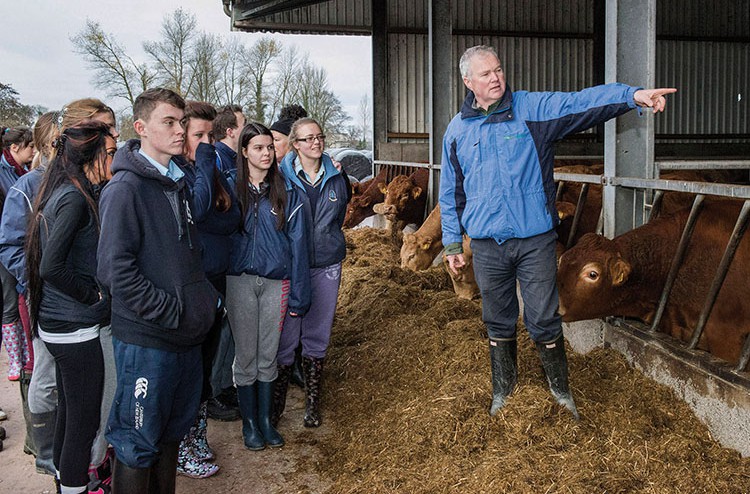
Agricultural Colleges have always been an important part of the farming industry, but as this sector has evolved, so too has the science of the trade and all budding farmers need to be up to speed with the latest technology.
That is why more and more farmers are heading to college and this is not just confined to young people out of school as the older generation are also partaking in courses to ensure that they are not left behind.
Farming has always been a massive part of our heritage and it will remain to be for many generations to come. We are currently entering a new era in the industry following the abolishing of the milk quota that has been in place for the last 31 years.
There are three privately own agricultural colleges located in Ireland and for this month’s edition of Irish Tractor & Agri, we profile one of these as the focus is on the Salesian Agricultural College in Pallaskenry, Co Limerick where we speak to Principal Derek O’Donoghue about what they have to offer.
Owned by the Salesian of Don Bosco, the Salesian Agricultural College, Pallaskenry is involved in the delivery of the Teagasc educational programme and is one of the leading agricultural colleges in the Munster region.
Located about 16km from Limerick city, the college is situated along the Shannon estuary where 210 hectares of land is farmed. The Salesian Agricultural College offers courses in both agriculture and farm machinery/mechanisation.
Courses are run in conjunction with Teagasc and Limerick Institute of Technology, being either FETAC or HETAC accredited, with all aspects of farming covered by the college.
Pallaskenry has excellent teaching and recreational facilities. An Information Technology Centre contains state of the art computers with internet and email access.
There are also a range of engineering/machinery workshops to facilitate the delivery of the colleges specialised machinery programmes.
Recreational facilities include an indoor heated swimming pool, an all-weather soccer pitch, football/hurling pitches and a games room. Full-time recreational students are accommodated in high quality, newly renovated single and double rooms.
“We offer a wide range of courses here, six in total, all of which allow progression to degree level, in various third level colleges” said Derek.
The Salesian College is also the home to the local secondary where 630 students attend, while in the region of 450 attend the agricultural college.
“There is very little crossover between the secondary school and the agricultural college, but we would use the same facilities from time to time. Between the two, there are over 1,000 students on the campus, but it works very well.”
Derek revealed that the agri-college has students from all over Munster attending and added that anyone over 17 years of age is welcome to do the entrance exam.
“We would be covering most of Munster alright. As well as the courses that we provide, we also have a dairy farm here where we milk 250 cows.”
The farm consists of 210 hectares and has a number of enterprises, which are run as commercial units.
“The dairy herd is the largest in the Agricultural College sector. There are 250 pedigree Holstein Friesian cows producing 1.6 million litres of milk. The cows are milked in a modern purpose built facility with a 24 unit milking parlour and a 200 cubicle dairy shed.
“One hundred and seventy cattle are reared to beef annually. A self-contained suckler unit for 60 cows has just been completed in recent years. There is also a 120 ewe sheep flock including 100 early lambing ewes. Thirty hectares of maize are grown to provide high energy feed for the high yielding liquid milk dairy herd.”
Pallaskenry has a total staff of 41 to ensure that the students are taught to the highest standard and Derek admitted that not all would go back to farming once their courses were complete.
“You have a wide range of industries that the students can go on to work in, engineering being one of them. Not all will return to farming, but the majority probably will.”
The college is funded and supported by Teagasc, which is the agriculture and food development authority in Ireland. Its mission is to support science-based innovation in the agri-food sector and the broader bio-economy that will underpin profitability, competitiveness and sustainability.
“Teagasc is the main provider of further education in agriculture, food, horticulture, forestry and equine studies. Many of its courses incorporate management practices and technologies on the home farm, supervised project work and discussion groups.
“In collaboration with Institutes of Technology we are providing an opportunity for students to advance from certificate level courses to honours degree level and beyond. Our further education courses are accredited by FETAC while our higher level courses are accredited by HETAC which means that our graduates have a qualification which is recognised at home and abroad.”
Over the years Teagasc has developed and delivered training programmes, workshops and seminars for the food & related sectors. These programmes are in the areas of innovation, food safety, quality and legislation.
Pallaskenry Agricultural College
Pallaskenry,
Co. Limerick
Tel: (061) 393100
Fax: (061) 393005
Email: [email protected]
Taken from Irish Tractor & Agri magazine Vol 3 No 5, June 2015
Agricultural College, Pallaskenry